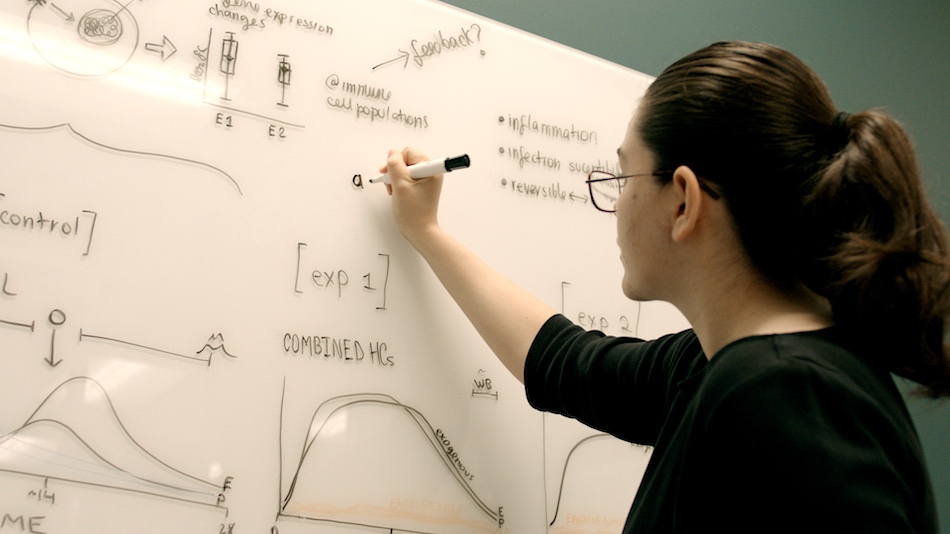Our research uses computational and statistical modeling to understand the genetic and epigenetic bases of gene regulation in the context of several important systemic, infectious, and immune-related diseases. We work on bringing systematic and unbiased approaches to help develop and test specific hypotheses in human genetics, molecular biology, and immunology. We are particularly interested in the analysis and modeling of the 3D genome organization from high-throughput chromatin conformation capture data to understand how changes in this 3D structure affect outcomes such as development, differentiation, and disease progression. Our lab develops broadly used computational methods based in statistics, graph theory, data mining, and machine learning for the analysis of high-throughput data sets. We also have ongoing interests in systems-level analysis and reconstruction of regulatory networks, inference of enhancer-promoter contacts, predictive models of gene expression, analysis of single-cell data, as well as integrative, comparative, and high-resolution analysis of chromosomes conformation data such as Hi-C and HiChIP.
Ay Lab
Ferhat Ay, Ph.D.
Associate Professor
Institute Leadership Assoc. Prof. of Computational BiologyCenter for Autoimmunity and InflammationCenter for Cancer ImmunotherapyCenter for Sex-based Differences in the Immune System
“
We look beyond the linear sequence of DNA to understand how the three-dimensional folding of the genome influences disease risk and severity for autoimmune diseases and cancer.
Featured Publications
Panwar B, Schmiedel BJ, Liang S, White B, Rodriguez E, Kalunian K, McKnight AJ, Soloff R, Seumois G, Vijayanand P, Ay F
Chandra V, Bhattacharyya S, Schmiedel BJ, Madrigal A, Gonzalez-Colin C, Fotsing S, Crinklaw A, Seumois G, Mohammadi P, Kronenberg M, Peters B, Ay F, Vijayanand P.
Roayaei Ardakany A, Gezer HT, Lonardi S, Ay F.
Mar 15, 2020
- Nat Protoc.
Kaul A, Bhattacharyya S, Ay F
Sep 17, 2019
- Nat Commun
Bhattacharyya S, Chandra V, Vijayanand P, Ay F
Oct 18, 2017
- Bioinformatics
Chakraborty A, Ay F
Lab Members

Ferhat Ay, Ph.D.
Associate Professor
Bolutito Babatunde, Ph.D.
Postdoctoral Fellow

Dante Bolzan
UCSD Graduate Student

Cemil Can Ali Marandi
UCSD Graduate Student

Abhijit Chakraborty, Ph.D.
Instructor

Nirmalya Dasgupta, Ph.D.
Instructor

Paramita Dutta
Research Tech III
Faisal Farouq, Associates
Student Trainee

Laura Hinojosa
UCSD Graduate Student
Dongwoo Kim
Student Trainee
Shaanti Raychaudhuri
Student Trainee

Daniela Salgado Figueroa
UCSD Graduate Student

Gurupreet Sethi, Ph.D.
Instructor
Ela Ustuner
Student Trainee
Boshuai Zhang
UCSD Graduate Student
From the Lab
- Immune Matters
Meet the LJI scientists changing medical research through artificial intelligence
- Immune Matters
LJI researchers are exploring the effects of hormonal contraceptives on immune responses—and the immune system's role in endometriosis. They're hearing from women along the way.
- Research News
New research may help scientists hunt down solid tumors and better diagnose disease
- Research News
Researchers map the genome to figure out how a protein called IKAROS controls healthy B cell development
- Institute News
Fleet's Sharp Minds lecture series to feature immune system experts
- Research News
LJI scientists uncover coordinated immune cell activity as a driver of systemic lupus erythematosus
Contact Lab Members
Use the dropdown menu on the right to contact individual lab members.
For interview requests, please contact LJI’s Chief Communications Officer by calling 858.752.6640 or via email at communications@lji.org.
Please send general inquiries to contact@lji.org.





